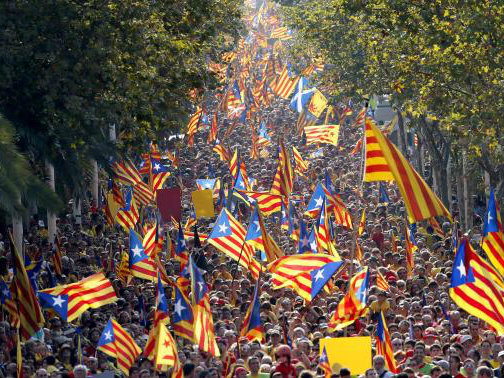Hundreds of thousands of Catalans thronging the streets of Barcelona yesterday cheered as fellow Catalan separatists formed a giant ‘V’ for ‘vote’, a choir sang, and a girl strode forward to place a piece of paper in a symbolic ballot box.
The Local has reported that the crowd were taking part in a rally to show support for the Catalan separatist movement, which has been growing increasingly boisterous as the Scottish Independence referendum, due to be held next Thursday, draws nearer. Yesterday was Catalonia’s ‘Diada’,or national day, on which the fall of Barcelona to French and Spanish forces in 1714 during the War of the Spanish Succession is commemorated.
Catalonia will be holding its own plebiscite on independence on 9th November, but unlike the British vote, the results will be neither recognised by Spain’s government, nor legally binding. Nonetheless, the crowd were in a bullish mood as they waved red and yellow striped Estelada flag of Catalan or the blue Saltire of Scotland. Many were themselves dressed in red or yellow, or wore t-shirts bearing the slogan “Now is the time”.
An official from Barcelona’s city hall, which is nationalist-led, told the media that turnout was estimated at 1.8 million people, but a Spanish government delegation refuted the figure, claiming it was closer to 500,000. A banner carried at the head of the rally read “November 9 we will vote. November 9 we will win”.
“If a nation such as Scotland can vote, why not Catalonia?” asked Catalonia’s regional president Artur Mas in an interview with AFP. “If the Catalan population wants to vote on its future, it’s practically impossible to stop that forever.”
“Nothing would thrill me more than for my first vote to be for the independence of Catalonia,” said Laura Sanchez Lora who was in attendance at the rally. “Now more than ever, Catalonia needs a state that will defend its language, its culture and its economy.”
Many Catalans, who are proud of their distinct language and heritage, feel that Catalonia, a relatively prosperous region of Spain, gets a raw deal from the central government. They point to their taxes being spent elsewhere and argue that they would be better off going it alone. In 2006, Catalonia formally declared itself as a separate nation, but Spain’s Constitutional Court overruled the claim.
The disagreement is likely to affect Scotland’s bid to join the EU if it does vote for independence next week. Pro-independence campaigners have said that they wanted to undertake negotiations to join the EU during the 18 months between the independence referendum and Scotland formally splitting from the rest of the UK in 2016.
The idea is to leave the UK and join the EU on the same day. But doubt has been cast upon this plan by European politicians who are not willing to say whether they would veto the Scottish bid to join or not.
“It’s unlikely we will have goodwill,” David Martin, a Scottish member of the European Parliament who opposes independence told the Wall Street Journal. “I don’t think Spain or Belgium or Romania or Italy or other counties with secessionist movements would ultimately block Scottish membership, but none would rush to make it easier for Scotland.”
Last year the then President of the Commission Jose Manuel Barosso said it would be “extremely difficult, if not impossible” for Scotland to gain approval to join the EU from the other member states. Speaking on the Andrew Marr Show, he said: “In case there is a new country, a new state, coming out of a current member state, it will have to apply and… the application and the accession to the European Union will have to be approved by all the other member states of the European Union.
“I don’t want to interfere on your referendum here, your democratic discussion here, but of course it will be extremely difficult to get the approval of all the other member states to have a new member coming from one member state.
“We have seen Spain has been opposing even the recognition of Kosovo, for instance. So it is to some extent a similar case because it’s a new country and so I believe it’s going to be extremely difficult, if not impossible, a new member state coming out of one of our countries getting the agreement of the others.”

COMMENTS
Please let us know if you're having issues with commenting.